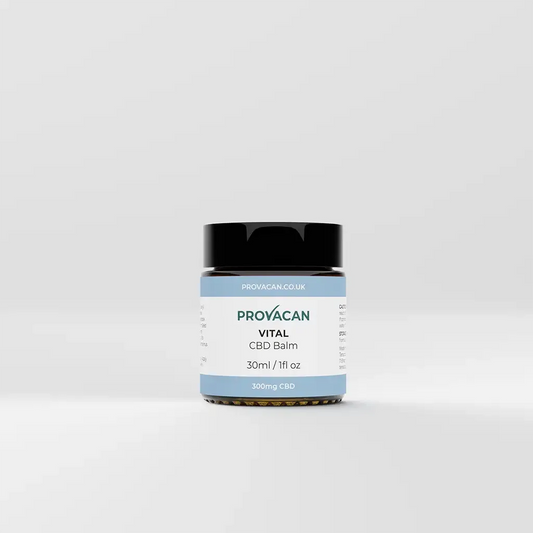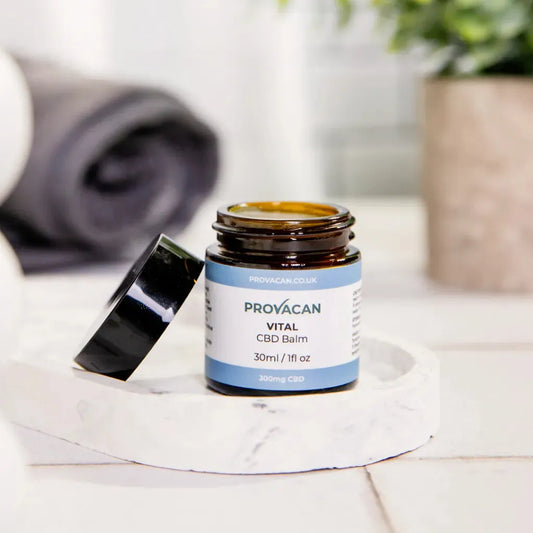Key Takeaways:
- Understanding CBD: Learn what CBD is, how it works, and why it’s different from THC.
- Choosing the Right Product: Get tips on selecting the best CBD product based on your needs and goals.
- Safe Use of CBD: Discover important precautions and considerations to ensure a positive experience with CBD.
As a leading provider of premium CBD products, Provacan has been at the forefront of the CBD industry, offering scientifically-backed, high-quality solutions for those seeking natural wellness. With a commitment to excellence and a customer-centric approach, Provacan’s range of products, including their carefully curated CBD Starter Kits, make it easier than ever to begin your CBD journey with confidence.
CBD, or cannabidiol, has rapidly gained popularity for its potential therapeutic benefits. From stress relief to enhanced sleep, the possibilities are vast, making it an intriguing option for those new to natural remedies.
In this guide, we will explore everything you need to know about CBD, providing a comprehensive overview tailored for beginners.
What Is CBD?
CBD, or cannabidiol, is a natural compound found in the cannabis plant. It is one of over 100 cannabinoids, which are chemical compounds that interact with the body’s endocannabinoid system. Unlike THC (tetrahydrocannabinol), another well-known cannabinoid, CBD does not have psychoactive effects, meaning it won’t make you feel “high.”
CBD has gained significant attention in recent years for its potential therapeutic benefits. It’s used in a variety of wellness products, from oils and tinctures to edibles and creams. People use CBD for a range of reasons, including stress relief, pain management, and improving sleep.
CBD is typically derived from hemp, a variety of cannabis that is low in THC but rich in CBD. Hemp-derived CBD products are legal in many places, as long as they contain less than 0.2% THC.
Understanding How CBD Works In The Body
Cannabidiol (CBD) has gained attention for its potential therapeutic effects, but to understand how it works, we need to explore its interaction with the body’s endocannabinoid system (ECS). The ECS is essential for maintaining balance within the body, influencing processes like mood, pain, appetite, and immune response. CBD’s interaction with this system, along with other receptors, highlights its potential to promote wellbeing and address various health issues. Let's break down how CBD functions in the body.
The Endocannabinoid System (ECS): The Body’s Regulatory System
The endocannabinoid system (ECS) is a vital network of receptors, enzymes, and naturally produced endocannabinoids that regulate key physiological functions. The two main receptors in the ECS are CB1, found mostly in the brain and central nervous system, and CB2, primarily located in the immune system and peripheral organs. CBD doesn’t bind directly to these receptors but instead influences their activity, helping the ECS maintain balance, or homeostasis, in the body. This interaction is thought to be the foundation of CBD’s potential benefits, including mood regulation and inflammation management.
CBD And Endocannabinoid Production: Boosting Natural Balance
CBD plays a significant role in enhancing the body’s natural production of endocannabinoids, which are crucial for maintaining balance within the ECS. By inhibiting the enzyme that breaks down endocannabinoids, CBD allows these molecules to remain active in the system longer, boosting their beneficial effects. This process may help manage conditions like chronic pain, inflammation, and anxiety by supporting the ECS in regulating these functions more effectively.
Interaction With Non-Cannabinoid Receptors: Expanding CBD’s Influence
Beyond the ECS, CBD interacts with other receptors in the body, such as serotonin and vanilloid receptors. For example, by interacting with the serotonin receptor (5-HT1A), CBD may help alleviate anxiety and improve mood. Additionally, its activation of the vanilloid receptor (TRPV1) can contribute to pain and inflammation relief. These interactions extend CBD’s potential therapeutic effects beyond the ECS, offering broader benefits for overall wellbeing.
Homeostasis And CBD: Supporting Body Balance
CBD’s primary impact on the body is its ability to promote homeostasis—keeping the body’s internal environment stable. By supporting the ECS and interacting with other key receptors, CBD can help maintain balance during times of stress or illness, potentially reducing symptoms like pain, anxiety, and inflammation. This makes CBD a valuable natural option for supporting overall health and helping manage various conditions.
Different Types of CBD Products
CBD is available in a wide variety of forms, allowing users to choose the product that best suits their needs and preferences. Here are the most common types of CBD products:
- CBD Oils and Tinctures: These are liquid extracts that are typically taken sublingually (under the tongue) for quick absorption. They come in various concentrations and are often favored for their versatility in dosing.
- CBD Edibles: These include gummies, chocolates, beverages, and other food products infused with CBD. Edibles are popular for their convenience and tasty flavors, but they take longer to take effect since they must be digested first.
- CBD Capsules and Pills: These are oral supplements that contain a precise dose of CBD. They are easy to incorporate into a daily routine and provide a consistent dosage, making them ideal for those who prefer a more traditional method of consumption.
- CBD Topicals: These are creams, balms, and lotions infused with CBD, applied directly to the skin. They are commonly used for localised relief from pain, inflammation, or skin conditions.
- CBD Patches: These are adhesive patches that deliver CBD directly through the skin over a period of time. They offer a steady release of CBD and are convenient for long-lasting effects.
- CBD Isolates: This is the purest form of CBD, usually in a crystalline or powder form, containing no other cannabinoids or plant compounds. Isolates can be added to foods, drinks, or other products for a custom CBD experience.
Each type of CBD product has its own set of advantages and considerations, so it’s important to choose the one that aligns with your personal needs and lifestyle.
Benefits Of Using CBD
CBD, or cannabidiol, has garnered widespread attention for its potential therapeutic benefits, supported by both scientific studies and anecdotal evidence. As interest in CBD continues to grow, more people are turning to it for relief from various health conditions. Below, we explore some of the key benefits of using CBD and how it may improve overall wellbeing.
Relief: Alleviating Chronic Discomfort
One of the most recognised benefits of CBD is its potential to relieve pain. Research suggests that CBD can reduce inflammation and interact with neurotransmitters in the brain to help alleviate chronic pain. This makes it a popular choice for individuals dealing with conditions such as arthritis, muscle pain, and nerve pain. By addressing the underlying inflammation and modulating pain signals, CBD may offer a natural alternative to traditional pain management methods.
Anxiety And Stress Reduction: Promoting Mental Calmness
CBD is also widely used for its potential to reduce anxiety and stress. By influencing the brain's serotonin receptors, which play a crucial role in mood regulation, CBD may help ease feelings of anxiety and stress. Many users find CBD beneficial for managing everyday stressors, social anxiety, and symptoms associated with generalised anxiety disorder. Its calming effects can provide a sense of mental peace, making it a useful tool for those seeking a natural approach to emotional wellbeing.
Improved Sleep: Enhancing Sleep Quality And Duration
For those struggling with sleep disorders such as insomnia, CBD has emerged as a promising natural remedy. By promoting relaxation and reducing anxiety, CBD can help improve both the quality and duration of sleep. Users often report falling asleep faster and experiencing more restful sleep, leading to better overall health and daytime alertness. CBD’s potential abilities to address the root causes of poor sleep, such as stress and anxiety, makes it a valuable aid for achieving a good night’s rest.
Neuroprotective Properties: Supporting Brain Health
Emerging research suggests that CBD may have neuroprotective properties, offering potential benefits for conditions like epilepsy and multiple sclerosis. The U.S. Food and Drug Administration (FDA) has even approved a CBD-based medication, Epidiolex, for treating certain forms of epilepsy, highlighting its potential in managing neurological disorders by helping to protect nerve cells from damage. CBD may contribute to better brain health and function.
Support For Mental Health: Addressing Depression And PTSD
Beyond its effects on anxiety, CBD is being studied for its potential role in supporting mental health conditions such as depression and post-traumatic stress disorder (PTSD). While research is still ongoing, preliminary findings and user reports suggest that CBD may help improve mood and emotional stability. Its influence on the brain’s neurotransmitter systems, including serotonin, could make it a valuable addition to the treatment options for various mental health challenges.
Anti-Inflammatory Effects: Easing Inflammatory Conditions
CBD has been studied for its potential anti-inflammatory properties, which make it a popular choice for individuals suffering from inflammatory and chronic conditions such as Crohn’s disease, irritable bowel syndrome (IBS), and autoimmune diseases. By potentially reducing inflammation in the body, CBD may help alleviate symptoms associated with these conditions, leading to improved quality of life.
Skin Health: Promoting Clear And Healthy Skin
Topical CBD products are increasingly being used in skincare routines due to their potential benefits for skin health. CBD’s potential anti-inflammatory and antioxidant properties could help with conditions like acne, eczema, and psoriasis. CBD may help calm irritated skin, reduce redness, and combat against oxidative stress, promoting the appearance of clearer and healthier complexion. Users are turning to CBD-infused creams, oils, and balms to address various skin concerns naturally.
Precautions And Considerations When Using CBD
While CBD is widely regarded as a safe and natural supplement, it is essential to approach its use with care, particularly if you are new to it. Like any supplement or medication, CBD affects individuals differently, and various factors should be considered to ensure a safe and positive experience. Below are key precautions and considerations to keep in mind when incorporating CBD into your routine.
Consulting With A Healthcare Provider: A Crucial First Step
Before starting any new supplement, including CBD, it is crucial to consult with a healthcare professional. This is especially important if you have pre-existing health conditions or are taking other medications. CBD has the potential to interact with certain medications, which could alter their effectiveness or lead to unintended side effects. A healthcare provider can help you determine whether CBD is appropriate for you and advise on safe usage based on your specific health needs.
Starting With A Low Dose: Finding The Right Balance
If you are new to CBD, it is advisable to start with a low dose and gradually increase it over time. Since everyone’s body reacts differently to CBD, starting with a lower dose allows you to gauge how your body responds without overwhelming it. Gradually increasing the dosage can help you find the optimal amount that delivers the desired effects without causing any discomfort or unwanted side effects. Patience and careful monitoring are key when determining the right dosage for your needs.
Being Aware Of Potential Side Effects: Understanding The Risks
While CBD is generally well-tolerated, it is important to be aware of potential side effects, which can include dry mouth, drowsiness, changes in appetite, and diarrhea. These side effects are typically mild and tend to diminish as your body adjusts to the CBD. However, if you experience persistent or severe side effects, it is important to consult with a healthcare provider. Being informed about possible side effects helps you manage your expectations and ensures you are prepared to address any issues that may arise.
Choosing High-Quality Products: Ensuring Safety And Efficacy
Not all CBD products are created equal, and quality can vary significantly between brands. It is essential to choose CBD products from reputable companies that provide third-party lab testing to verify the product’s quality, potency, and safety. High-quality products should be free from harmful contaminants such as pesticides, heavy metals, and mold. By selecting products that meet these standards, you can ensure that you are using a safe and effective CBD supplement.
Understanding The Legal Status: Navigating Regulations
The legal status of CBD varies depending on where you live, so it is important to be aware of the regulations in your area before purchasing or using CBD products. In many regions, only hemp-derived CBD products containing less than 0.2% THC are legal. Understanding the legal framework surrounding CBD in your location can help you avoid any legal complications and ensure that you are using CBD within the boundaries of the law.
Considering The Form Of CBD: Matching Your Needs
CBD is available in various forms, including oils, edibles, topicals, and capsules, each with different onset times and durations of effects. When choosing a form of CBD, consider your lifestyle, preferences, and specific needs. For example, if you need fast relief, a sublingual oil may be more appropriate, while a topical application might be better for localised issues like muscle pain. Understanding the differences between CBD forms allows you to select the one that best aligns with your goals and enhances your overall experience.
Final Thoughts
CBD presents a promising array of benefits for those seeking wellness and relief from various conditions. As you begin your journey with CBD, it's crucial to understand how it works in the body, explore the different types of products available, and align your choice with your personal wellness goals. Starting with a low dose, consulting a healthcare provider if necessary, and choosing high-quality, lab-tested products are key steps to ensure a safe and effective experience.
While CBD may not be a universal solution, it can be a valuable addition to your wellness routine when approached thoughtfully. Whether you're looking for pain relief, reduced anxiety, better sleep, or overall wellbeing, CBD offers a natural option worth exploring. With the right knowledge and careful consideration, CBD can support your journey toward improved health and balance.
Read also:
- What Is CBD Used For? Benefits and Options
- Can You Overdose On CBD?
- How To Use CBD Oil: Complete Guide
Frequently Asked Questions About CBD
What is the difference between CBD and THC?
CBD (cannabidiol) and THC (tetrahydrocannabinol) are both cannabinoids found in cannabis. The main difference is that THC has psychoactive effects (it makes you feel "high"), while CBD does not.
Can CBD make you fail a drug test?
CBD itself should not make you fail a drug test, but some products contain trace amounts of THC. If avoiding THC is crucial, opt for broad-spectrum or CBD isolate products.
Is it safe to use CBD every day?
Yes, many people use CBD daily for consistent benefits. However, it's advisable to start with a lower dose and increase gradually while monitoring your body's response.
How long does it take for CBD to start working?
The onset of CBD’s effects depends on the delivery method. Sublingual oils can work within 30 minutes, while edibles may take 30 minutes to 2 hours as they need to be digested.
Can I use CBD with other medications?
CBD can interact with certain medications. It’s important to consult with a healthcare provider before combining CBD with other prescriptions, especially those with a "grapefruit warning."
Is CBD addictive?
CBD is not addictive and does not produce the “high” associated with THC. It is generally considered safe for long-term use without the risk of dependence.
How should I store my CBD products?
Store CBD products in a cool, dark place away from heat and light to maintain their potency. Refrigeration is recommended for some items like oils or edibles.
What should I look for in a quality CBD product?
Look for products that are third-party lab tested, clearly labeled, and free from harmful additives. Choosing products from reputable brands like Provacan ensures quality and safety.
Is there a difference between hemp oil and CBD oil?
Yes, hemp oil is made from hemp seeds and contains no CBD. CBD oil is extracted from the flowers, leaves, and stalks of the hemp plant and contains active cannabinoids.
Sources:
- White, C. M. (2019). A Review of Human Studies Assessing Cannabidiol’s (CBD) Therapeutic Actions and Potential. The Journal of Clinical Pharmacology, 59(7), 923–934. https://doi.org/10.1002/jcph.1387
- Burstein, S. (2015). Cannabidiol (CBD) and its analogs: a review of their effects on inflammation. Bioorganic & Medicinal Chemistry, 23(7), 1377–1385. https://doi.org/10.1016/j.bmc.2015.01.059
- Williams, C., & Nutbrown, D. (2021). A Review of Research into the Health Benefits of Cannabidiol (CBD). https://www.theneighborhoodacademy.org/editoruploads/files/Carrington_Williams_-_Review_of_CBD_Health_Benefits.pdf






















